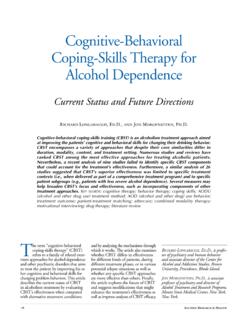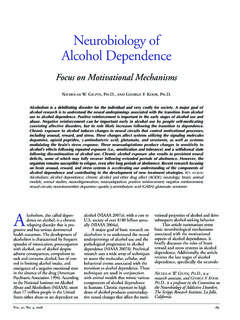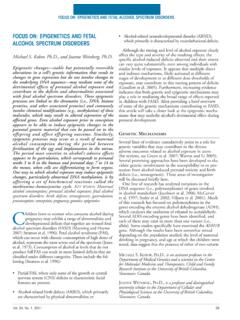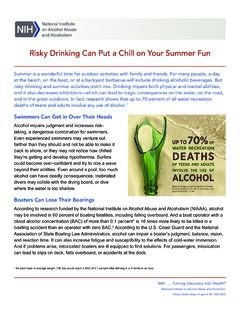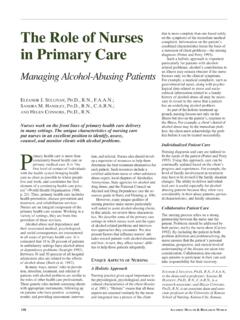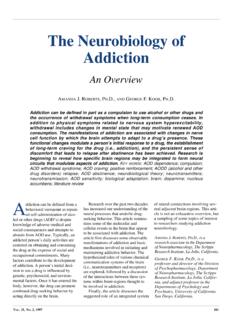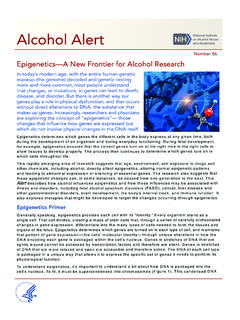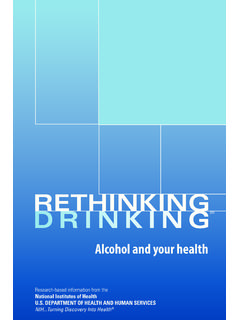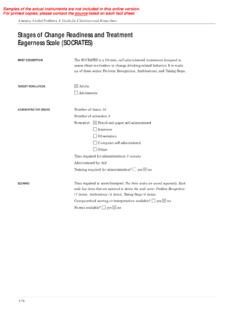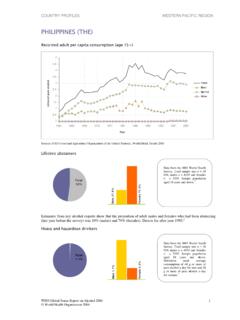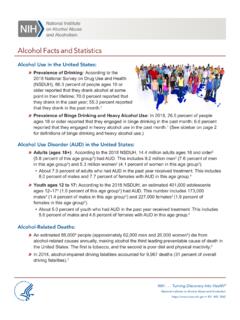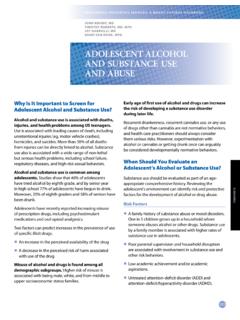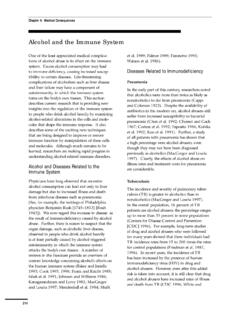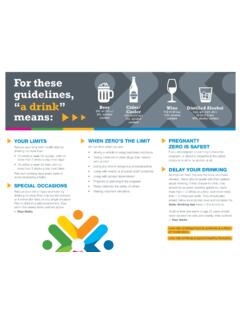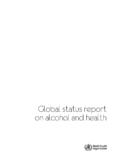Transcription of Parenting Influences on the Development of Alcohol Abuse ...
1 Over the past century, researchersincreasingly have explored thefamily s role in the develop-ment ( , etiology), course, treat-ment, and prevention of Alcohol abuseand dependence (Windle and Searles1990). Much of this research hasfocused on the children of alcoholics(COA s), who are at a significantlyhigher risk of becoming alcoholicthemselves than are the children ofnonalcoholics (non-COA s). Variousperspectives have been used to guideempirical studies in this area, includ-ing genetic-biological efforts; studiesof the personality and psychosocialcharacteristics of the alcoholic as wellas of his or her spouse and children;and analyses of other variables ( ,moderator variables), such as familystructure, social class, and article focuses on influencesoriginating in the family environment particularly Parenting Influences thatare relevant to the Development ofalcohol Abuse and dependence in discussion includestwo types of family Influences : alco-hol-specific and non- Alcohol -specificeffects.
2 Alcohol -specific effects re-flect the impact of parental alcoholuse and Abuse on the child s alcoholuse and Abuse behavior; accordingly,these Influences are more relevant toCOA s than to non-COA s. Non- Alcohol -specific effects, in contrast,include more general features of thefamily environment that increase thechild s risk for deviant behavior, in-cluding Alcohol Abuse . As a result,these Influences affect all children andadolescents and are not specific toCOA s. Some non- Alcohol -specificinfluences, however, also may have aparticularly strong impact on COAoutcome, because certain factors con-tributing to these effects ( , parentalpsychopathology) are more prevalentamong COA s than among non-COA RESEARCHWORLDP arenting Influences on theDevelopment of Alcohol Abuseand DependenceTHEODOREJACOB, , ANDSHERIJOHNSON, Alcohol -specific and non- Alcohol -specific Parenting Influences affect thedevelopment of Alcohol Abuse and dependence in the offspring.
3 Alcohol -specificinfluences ( , the modeling of parental drinking behavior, the Development of alcoholexpectancies, and certain aspects of the parent-child relationship) are particularlyrelevant to the Development of Alcohol Abuse and dependence in children of alcoholics. Incontrast, non- Alcohol -specific Influences generally promote deviant behavior, includingalcohol problems, in the offspring and affect children of alcoholics and nonalcoholicsequally. These Influences , which include inadequate Parenting and other parent-childinteraction patterns that promote aggressive, antisocial behavior in children, increase theoffspring s risk of an alcoholism subtype associated with antisocial personality different set of non- Alcohol -specific family Influences may contribute to an alcoholismsubtype that emerges after the onset of WORDS: children of alcoholics; familyenvironment; Parenting skills; AODU ( Alcohol and other drug use) Development ; AOD usebehavior; offspring; role model; expectancy; parent child relations; antisocial behavior; conductdisorder; emotional and psychiatric depression; Alcohol use disorder classification.
4 Literature review1 For additional background material andreferences, see Jacob and Leonard (1994) andSeilhamer and Jacob (1990).THEODOREJACOB, , is a careerresearch scientist at the Palo AltoVeterans Administration Health CareSystem, Palo Alto, , , is an assistantprofessor of psychology at the Univer-sity of Miami, Coral Gables, Florida. The strongest model of the role offamily environmental Influences in thedevelopment of alcoholism emphasizesthese studies have demonstratedthat the drinking patterns of parentsand their adolescent and adult childrenare highly correlated. For example,one study found that adolescentCOA s are times more likely thannon-COA s to report a social conse-quence or dependence symptom relat-ed to Alcohol and other drug (AOD)use (Chassin et al. 1991). Considerableuncertainty still exists, however, re-garding howparental Alcohol abuseincreases the children s risk for alco-hol problems.
5 Research to determinethe influence of parental drinking hasevaluated individual, dyadic, andfamily-level effects represent theimpact of one person s behavior on thechild s outcome. Studies of these ef-fects have focused on the roles ofparent modeling and Alcohol expectan-cies in shaping COAs drinking behav-ior. These analyses address questionssuch as the following: Do childrenmodel their parents drinking behav-ior? What Alcohol expectancies doCOA s have ( , how do they expectto feel when they drink Alcohol )? (Formore information on these issues, alsosee the article by Ellis et al., 226.) Dyadic effects result fromthe interactions of two family mem-bers. Studies of dyadic effects havefocused on the parents marital rela-tionship, the parent-child relationship,and the child s relationship with his orher siblings.
6 A few lines of researchalso have highlighted family leveleffects, such as the overall familyclimate and interactional EffectsAlthough extensive developmentalliterature exists describing children smodeling of various parental behav-iors, relatively little research has in-vestigated this topic among COA , findings of a strong linkbetween the quantity of Alcohol use inchildren and their parents suggest thatthis area warrants further research also is necessary tounderstand whether different patternsof parental drinking have implicationsfor drinking style and problems amongCOA s. For example, are children ofbinge-drinking alcoholics more likelyto exhibit that same drinking style?Previous studies have suggested thatthe extent to which a child models thebehavior of his or her parent(s) also ismoderated by the warmth and degreeof reinforcement shown by the par-ent(s) (Bandura 1969).
7 Accordingly, Alcohol researchers must consider notonly drinking patterns but also familyrelationships when evaluating the roleof modeling in determining COAs drinking studies have suggested that aperson s beliefs regarding the effects ofalcohol ( , cognitive Alcohol expectan-cies) can be important predictors ofalcohol use and Abuse . Furthermore,studies assessing the impact of parentaldrinking on the Development of chil-dren s Alcohol expectancies have re-vealed the following: Children s perceptions of parentaldrinking quantity and circumstancesappear to influence their own drink-ing frequency (Brook et al. 1990;Kandel and Andrews 1987). Children s Alcohol expectanciesreflect recognition of Alcohol -related norms and a cognizance ofparental drinking patterns by a veryearly age (Zucker et al. 1995).
8 Alcohol expectancies appear to beone of the mechanisms explainingthe relationship between paternalalcoholism and heavy drinkingamong offspring during college(Sher et al. 1996). Changes in parental drinking pat-terns result in changes in the natureand impact of children s Alcohol -related expectancies. In a 3-yearstudy of adolescent COA s, thosewhose fathers no longer experi-enced Alcohol -related problemsdemonstrated a stronger relationbetween their beliefs in restraineddrinking and lowered Alcohol usethan did COA s whose fatherscontinued to experience Alcohol -related problems. Moreover, beliefin drinking restraint predictedlower AOD consumption (Chassinand Barrera 1993). These findings suggest that the role ofexpectancies in shaping drinkingpatterns should be explored studies also should address howfamily environments may moderatethe relationship between the parent sdrinking style and the child s cogni-tive expectancies.
9 Dyadic EffectsOf the various family dyads, the par-ent-child relationship has received themost attention in the study of Alcohol -specific family Influences , althoughthe role of sibling relationships alsohas been evaluated (see box, p. 206).Several studies have assessed thequality of the parent-child relationshipin families with an alcoholic parent tolearn more about the factors that con-tribute to heavy drinking by adoles-cent COA s (Chassin et al. 1993,1996; Kandel and Andrews 1987).The results of these investigationssuggest that paternal Alcohol abusemay be associated with decreasedmonitoring of the children s particular facet of Parenting , inturn, is a risk factor for increasedassociation with AOD-using peers,and thereby for AOD use, among thechildren. These findings indicate thatfurther clarification of parent-childrelationships will enhance our under-standing of the intergenerationaltransmission of EffectsTo date, relatively little research hasevaluated family characteristics, suchas communication, warmth, and cohe-sion, that may influence the risk ofdrinking problems in COA s.
10 In anotable exception, Wolin and col-VOL. 21, NO. 3, 1997205 Parenting Influences on Alcohol Abuse and Dependenceleagues (1980) have suggested that theextent to which drinking disrupts fam-ily rituals, such as holiday events anddaily routines, predicts the children srisk for Alcohol Abuse . This line ofresearch shows the value of tracingdifferences among alcoholic familiesas a way of better understanding whysome, but not all, COA s developAOD use-related interaction patterns alsomay influence the COA s risk foralcohol Abuse . For example, Jacob andKrahn (1988) found that families withan alcoholic parent displayed morenegative family interaction duringproblem-solving discussions than didcontrol families in which the parentsexhibited no alcoholism or majorpsychopathology. In addition, parentalbinge drinking appears to be associat-ed with more disturbed family interac-tions than does steady drinking (Jacoband Leonard 1988).

